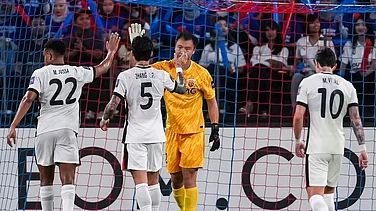South African athlete Oscar Pistorius was due to be released from prison on parole Friday, more than a decade after he shot his girlfriend Reeva Steenkamp in a Valentine's Day killing that shattered the reputation of a sports superstar.
Television crews, photographers and news reporters gathered outside the gates of the Atteridgeville Correctional Center in the South African capital of Pretoria before 6 a.m., waiting to catch a glimpse of the world-famous double-amputee Olympic runner.
Department of Corrections officials have said that Pistorius' release time on Friday will not be announced in advance and he will not be “paraded,” indicating they will attempt to keep him away from the media glare that has trailed him since he shot Steenkamp multiple times through a toilet door at his home in the predawn hours of Feb. 14, 2013.
Pistorius, 37, will be transported from the prison to a corrections department office to be processed before he is officially released on parole. He is expected to initially live at his uncle's mansion in the upscale Pretoria suburb of Waterkloof, where he lived during his murder trial and where he was held on house arrest for a period in 2015-2016.
Bright yellow traffic barriers have been placed across a road leading to his uncle's house, possibly in preparation for Pistorius' arrival.
Pistorius was approved for parole in November, the second time he had applied. He has served nearly nine years of his 13 years and five months murder sentence for the killing of Steenkamp. Serious offenders in South Africa are eligible for parole after serving at least half of their sentence.
Steenkamp's mother, June Steenkamp, said in a statement that she had accepted Pistorius' parole as part of South African law.
“Has there been justice for Reeva? Has Oscar served enough time? There can never be justice if your loved one is never coming back, and no amount of time served will bring Reeva back," June Steenkamp said. "We who remain behind are the ones serving a life sentence.”
“With the release of Oscar Pistorius on parole, my only desire is that I will be allowed to live my last years in peace with my focus remaining on the Reeva Rebecca Steenkamp Foundation, to continue Reeva's legacy.”
Pistorius will live under strict conditions until the remainder of his sentence expires in December 2029, the Department of Corrections said. It emphasized that the multiple Paralympic champion's release — like every other offender on parole — does not mean that he has served his time.
Some of Pistorius' parole conditions include restrictions on when he's allowed to leave his home, a ban on consuming alcohol, and orders that he must attend programs on anger management and on violence against women. He will have to perform community service.
Pistorius will also have to regularly meet with parole officials at his home and at correctional services offices and will be subjected to unannounced visits by authorities. He is not allowed to leave the Waterkloof district without permission and is banned from speaking to the media until the end of his sentence. He could be sent back to jail if he is in breach of any of his parole conditions.
South Africa does not use tags or bracelets on paroled offenders so Pistorius will not wear any monitoring device, Department of Corrections officials said. But he will be constantly monitored by a department official and will have to inform the official of any major changes in his life, such as if he wants to get a job or move to another house.
Pistorius has maintained that he shot Steenkamp, a 29-year-old model and law graduate, by mistake. He testified that he believed Steenkamp was a dangerous intruder hiding in his bathroom and shot through the door with his licensed 9 mm pistol in self-defense.
Prosecutors said he killed his girlfriend intentionally during a late-night argument.
Steenkamp's family did not oppose his parole application in November, although June Steenkamp said in a victim statement submitted to the parole board that she didn't believe Pistorius had been fully rehabilitated and was still lying about the killing.
Before the killing, Pistorius was held up as an inspiring role model after having had both of his legs amputated below the knee as a baby because of a congenital condition. He became a champion sprinter on his carbon-fiber running blades and made history by competing at the 2012 London Olympics.
But his murder trial destroyed his image. He was accused of being prone to angry outbursts and acting recklessly with guns, while witnesses testified about various altercations he had with others, including an argument in which he allegedly threatened to break a man's legs.
Pistorius was first convicted of culpable homicide — a charge comparable to manslaughter — and sentenced to five years in prison for killing Steenkamp. After appeals by prosecutors, he was ultimately found guilty of murder and had his sentence increased, although that judgment by the Supreme Court of Appeal still didn't definitively rule that he knew it was Steenkamp behind the toilet door.
Pistorius was first sent to prison in 2014, was released on house arrest in 2015 during an appeal and was sent back to prison in 2016. He was initially incarcerated at the maximum security Kgosi Mampuru II Prison in Pretoria but was moved to Atteridgeville early in his sentence because it is better suited to holding disabled prisoners.
Reaction to Pistorius' parole has been muted in South Africa, a stark contrast to the first days and months after Steenkamp's killing, which sparked angry protests outside of Pistorius' court hearings calling for him to receive a long prison sentence. There is no death penalty in South Africa.
“He has ticked all the necessary boxes,” said Themba Masango, secretary general of Not In My Name International, a group that campaigns against violence against women. “And we can only wish and hope Oscar Pistorius will come out a better human being.” “We tend to forget that there is a possibility where somebody can be rehabilitated.”


























